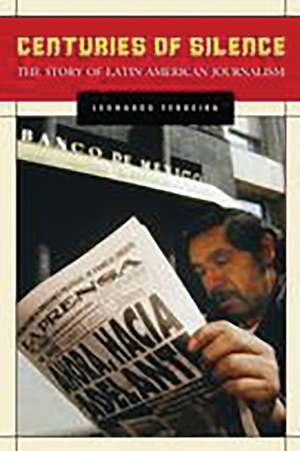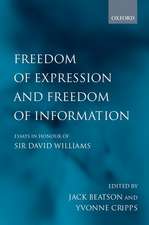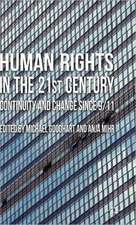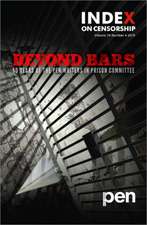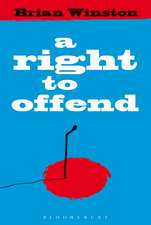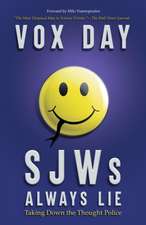Centuries of Silence: The Story of Latin American Journalism
Autor Leonardo Ferreiraen Limba Engleză Hardback – 29 oct 2006 – vârsta până la 17 ani
| Toate formatele și edițiile | Preț | Express |
|---|---|---|
| Paperback (1) | 176.11 lei 6-8 săpt. | |
| Bloomsbury Publishing – 29 oct 2006 | 176.11 lei 6-8 săpt. | |
| Hardback (1) | 440.61 lei 6-8 săpt. | |
| Bloomsbury Publishing – 29 oct 2006 | 440.61 lei 6-8 săpt. |
Preț: 440.61 lei
Preț vechi: 605.81 lei
-27% Nou
Puncte Express: 661
Preț estimativ în valută:
84.32€ • 87.11$ • 70.14£
84.32€ • 87.11$ • 70.14£
Carte tipărită la comandă
Livrare economică 19 martie-02 aprilie
Preluare comenzi: 021 569.72.76
Specificații
ISBN-13: 9780275983970
ISBN-10: 0275983978
Pagini: 344
Dimensiuni: 156 x 235 x 30 mm
Greutate: 0.67 kg
Editura: Bloomsbury Publishing
Colecția Praeger
Locul publicării:New York, United States
ISBN-10: 0275983978
Pagini: 344
Dimensiuni: 156 x 235 x 30 mm
Greutate: 0.67 kg
Editura: Bloomsbury Publishing
Colecția Praeger
Locul publicării:New York, United States
Notă biografică
LEONARDO FERREIRA is Associate Dean and Director of Graduate Studies at the University of Miami and a consultant to the Inter-American Press Association, the Grupo de Diarios America, and BBC Latin America.
Cuprins
ForewordIntroduction: When Good News Is Bad NewsChapter 1 Whose Truth on True StreetChapter 2 A Taste of FreedomChapter 3 Taken by War and CensorshipChapter 4 Modernization and the PressChapter 5 How Not to Start a CenturyChapter 6 Hot and Cold Wars, Warm PressesChapter 7 Dreaming a Fair WorldChapter 8 One Step Forward, Dozen BackwardsBibliographyIndex
Recenzii
Probably the most detailed account of the Latin American mass media ever published in English, this well-annotated book presents a history of Latin American mass communication from precolonial times to the present. Covering the development of journalism education in Latin America and reviewing some of the arguments critical of the current globalization of media technologies, Ferreira provides less a discussion of news organizations than an overview of Latin American media and social policy and cultural and social development. He cuts across borders from Mexico to Chile and is mindful to include historical comparisons of how media trends in Latin America differed from those in the US and western Europe..The book will be a valuable resource for those interested in international mass media. Recommended. Graduate students, researchers, faculty, and professionals.
The greatest strength of Ferreira's work lies in his successful synthesis of an increasing body of secondary material on the region and the subject. His book provides a useful reference for historians and students who desire a compendium of the major developments and struggles that journalists have endured over the past 200 years in Latin America..[I]t is clear that Ferreira went to great lengths to synthesize the existing body of scholarship. His efforts are commendable and his work provides a useful took for instructors interested in a survey of the literature of the history of the news media in Latin America.
Centuries of Silence: The Story of Latin American Journalism by Leonardo Ferreira takes on a huge taskto review and summarize the story of Latin American newspapers and broadcast journalism. A member of the communication faculty at the University of Miami as well as a consultant to the Inter American Press Association, the author grew up in Colombia before attending college and grad school in the United States. His history is critical, in almost every sense of that term, as he finds the press too much under the thumb of various national elites, and rarely sticking up for the common person or criticizing government personnel or policies.
Ferreira begins by asking whether there was a nascent or proto-journalism in pre-Columbian America. Then he looks at such stages of Latin American journalism as the idealism surrounding liberation from Spain; war, censorship, and propaganda during the 19th century; revolution and the Cold War; and tension between globalization and a fair and humane world.
[L]eonardo Ferreira combines a trilingual review of the literature with his own original research to produce a book that challenges conventional theories about how the region's news media came to be what they are today and, indeed, what exactly they are..Besides providing a base for further work in the field, this book will complement standard interpretations of Latin American media scholars as well as researchers who want to understand the background that has shaped an expanding segment of the potential U.S. media audience..Centuries of Silence makes an important contribution to that understanding.
The greatest strength of Ferreira's work lies in his successful synthesis of an increasing body of secondary material on the region and the subject. His book provides a useful reference for historians and students who desire a compendium of the major developments and struggles that journalists have endured over the past 200 years in Latin America..[I]t is clear that Ferreira went to great lengths to synthesize the existing body of scholarship. His efforts are commendable and his work provides a useful took for instructors interested in a survey of the literature of the history of the news media in Latin America.
Centuries of Silence: The Story of Latin American Journalism by Leonardo Ferreira takes on a huge taskto review and summarize the story of Latin American newspapers and broadcast journalism. A member of the communication faculty at the University of Miami as well as a consultant to the Inter American Press Association, the author grew up in Colombia before attending college and grad school in the United States. His history is critical, in almost every sense of that term, as he finds the press too much under the thumb of various national elites, and rarely sticking up for the common person or criticizing government personnel or policies.
Ferreira begins by asking whether there was a nascent or proto-journalism in pre-Columbian America. Then he looks at such stages of Latin American journalism as the idealism surrounding liberation from Spain; war, censorship, and propaganda during the 19th century; revolution and the Cold War; and tension between globalization and a fair and humane world.
[L]eonardo Ferreira combines a trilingual review of the literature with his own original research to produce a book that challenges conventional theories about how the region's news media came to be what they are today and, indeed, what exactly they are..Besides providing a base for further work in the field, this book will complement standard interpretations of Latin American media scholars as well as researchers who want to understand the background that has shaped an expanding segment of the potential U.S. media audience..Centuries of Silence makes an important contribution to that understanding.
